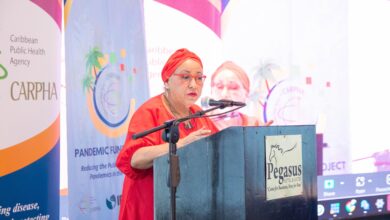(CARICOM Secretariat, Turkeyen, Greater Georgetown, Guyana) “The public service must be made aware of their integral role in advancing the objectives and implementing the decisions of the Caribbean Community (CARICOM),” said His Excellency Edwin Carrington, CARICOM Secretary-General.
He was at the time addressing the Board of Directors of the Caribbean Centre for Development Administration (CARICAD). They met at the headquarters of the CARICOM Secretariat, Georgetown, Guyana, on Wednesday July 8, 2009 on the occasion of their twenty-ninth meeting.
CARICAD focuses, through various interventions, on upgrading and strengthening the managerial capability of the public sector for the more effective implementation of public policy across the Region.
Since its establishment in 1980, CARICAD had been working to advance public sector reform, particularly in providing technical assistance to support member governments in their quest to improve efficiency through initiatives which seek to transform and modernize the public sector.
In this regard, one of the organisation’s key tasks has been the promotion of an E-government project to recast the connection between people and their government, and between governments of the Region through the use of technology.
While acknowledging the use of technology in improving the efficiency of the public sector and in connecting the Region, Secretary-General Carrington noted that the other “key core” factor of the regional integration arrangements was the human resource of the Community.
Emphasising the critical role of the public service in advancing regional integration, Secretary-General said that public officers were at the forefront; in a position to make a difference whether negative or positive.
“Unless there is a commitment to the idea of regional integration by the people on the frontline, no amount of technology will move the process forward,” he stated.
It was against this backdrop, Secretary-General Carrington said, that the Conference of Heads of Government at its 30th Regular Meeting had agreed on the importance of training and sensitising of public officers, particularly immigration officers.
Secretary-General Carrington said however, that this training and sensitising did not only apply to immigration officers but to all public officials, and this was critical, he added, since the implementation of the Community’s decisions “lies essentially in the province of Member States.”
“The CARICOM Secretariat and the regional institutions have their role in facilitating and co-ordinating, cannot implement at the national level; whether it is in agriculture, free movement, contingent rights, security and investment” he said.
The Secretary-General added that there must be an understanding and acceptance that national goals are not distinct from the Community’s goals, and that there was no contemplation of replacing the national public services with a gigantic regional public service.
“The objective is for a seamless space that will strengthen the parts to ensure a solid whole,” he stated.
To achieve this goal, Secretary-General Carrington posited that national public services across the Community should all be operating on the same basic principles in the conduct of their duties. In this regard, the work of CARICAD became more significant in establishing coherence and harmonisation among its stakeholders to redound to the benefit of the integration process, he added.
“Our quest for a viable, prosperous, secure and sustainable Community for All requires all hands on deck,” the Secretary-General said.
CARICAD has a current membership of 14 countries: Antigua and Barbuda, The Bahamas, Barbados, Belize, British Virgin Islands, Dominica, Grenada, Guyana, Jamaica, Montserrat, St. Lucia, St. Kitts and Nevis, St. Vincent and the Grenadines, Trinidad and Tobago. Anguilla and the Turks and Caicos Islands are associate members.





